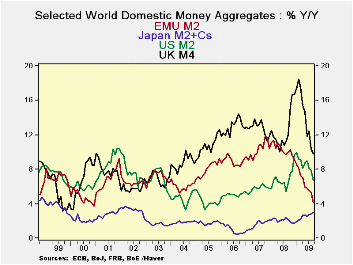 Global| Oct 27 2009
Global| Oct 27 2009Money Supplies Continue to Erode
Summary
Over view: Money supply growth in the key economies continues to erode on a broad front. Japan sports a contrary pattern with steadily increasing growth in money supply. The UK has been through the biggest boom/bust in money supply [...]

Over view: Money supply growth in the key economies continues
to erode on a broad front. Japan sports a contrary pattern with
steadily increasing growth in money supply. The UK has been through the
biggest boom/bust in money supply growth; the economy is still
languishing in recession. Money growth in the US and in the e-Zone is
slowing as well.
Credit growth in EMU has turned negative. Loan growth is
declining even over 12-months. In real terms, credit to residents is
also falling. Over three-months inflation-adjusted loan volume in the
Zone is falling; over six months it’s flat.
Real money supplies are declining over six months in the US
and in the UK. In EMU real money balances are growing at a low 2% pace.
Japan’s inflation-adjusted money supply is accelerating or stabilizing.
While it is clear that different regions have different
nominal and real money growth characteristics, only Japan is showing a
steady move back to monetary stimulus. At that it still has the lowest
Yr/Yr nominal money growth in the group. The UK has the biggest drop
off in nominal money growth but still had the strongest Yr/Yr rate of
growth. The US and EMU growth rates are closer together with EMU the
peak coming earlier than in the US.
The more disturbing news is the lack of credit growth. In EMU it is contracting. Banks have been stabilized by various policy actions, but those actions did not translate directly into help for the nonbank sector as banks have been very careful with new lending. In the US the President is now trying to jawbone to stimulate small business lending. Without credit growth, money growth will not be fully activated. In the US small business is the main source of job growth which is greatly needed to produce a real recovery. In Germany Chancellor Merkel is warning of another crisis in 2011 and more unemployment. There remains a lot of work to be done to get areal recovery going.
| Look at Global and Euro Liquidity Trends | |||||||
|---|---|---|---|---|---|---|---|
| Saar-all | Euro Measures (E13): Money & Credit | G-10 Major Markets: Money | Memo | ||||
| €€-Supply M2 | Credit: Residential |
Loans | $US M2 | ££UK M4 | ¥ ¥Jpn M2+Cds | OIL:WTI | |
| 3-MO | 2.8% | 0.3% | -1.6% | -1.9% | 8.7% | 3.2% | -0.4% |
| 6-MO | 2.8% | 0.8% | -0.9% | 0.2% | 1.7% | 3.3% | 112.9% |
| 12-MO | 4.1% | 2.1% | -0.3% | 6.7% | 9.8% | 3.0% | -32.7% |
| 2Yr | 7.0% | 6.3% | 4.2% | 6.5% | 10.9% | 2.6% | -6.2% |
| 3Yr | 8.1% | 7.9% | 6.3% | 6.5% | 11.6% | 2.3% | 2.8% |
| Real Balances: deflated by Own CPI. Oil deflated by US CPI | |||||||
| 3-MO | 2.0% | -0.4% | -2.3% | -4.3% | 5.3% | 4.0% | -2.8% |
| 6-MO | 2.0% | 0.0% | -1.7% | -2.6% | -1.0% | 5.2% | 106.9% |
| 12-MO | 4.5% | 2.5% | 0.1% | 8.1% | 8.6% | 5.2% | -31.8% |
| 2Yr | 5.3% | 4.6% | 2.5% | 4.7% | 7.5% | 2.6% | -7.8% |
| 3Yr | 6.2% | 6.0% | 4.4% | 4.3% | 8.7% | 2.4% | 0.7% |
| Japan CPI for Aug is an estimate; it uses the July value to produce the real balance figure | |||||||
Robert Brusca
AuthorMore in Author Profile »Robert A. Brusca is Chief Economist of Fact and Opinion Economics, a consulting firm he founded in Manhattan. He has been an economist on Wall Street for over 25 years. He has visited central banking and large institutional clients in over 30 countries in his career as an economist. Mr. Brusca was a Divisional Research Chief at the Federal Reserve Bank of NY (Chief of the International Financial markets Division), a Fed Watcher at Irving Trust and Chief Economist at Nikko Securities International. He is widely quoted and appears in various media. Mr. Brusca holds an MA and Ph.D. in economics from Michigan State University and a BA in Economics from the University of Michigan. His research pursues his strong interests in non aligned policy economics as well as international economics. FAO Economics’ research targets investors to assist them in making better investment decisions in stocks, bonds and in a variety of international assets. The company does not manage money and has no conflicts in giving economic advice.
More Economy in Brief
 Global| Feb 05 2026
Global| Feb 05 2026Charts of the Week: Balanced Policy, Resilient Data and AI Narratives
by:Andrew Cates






